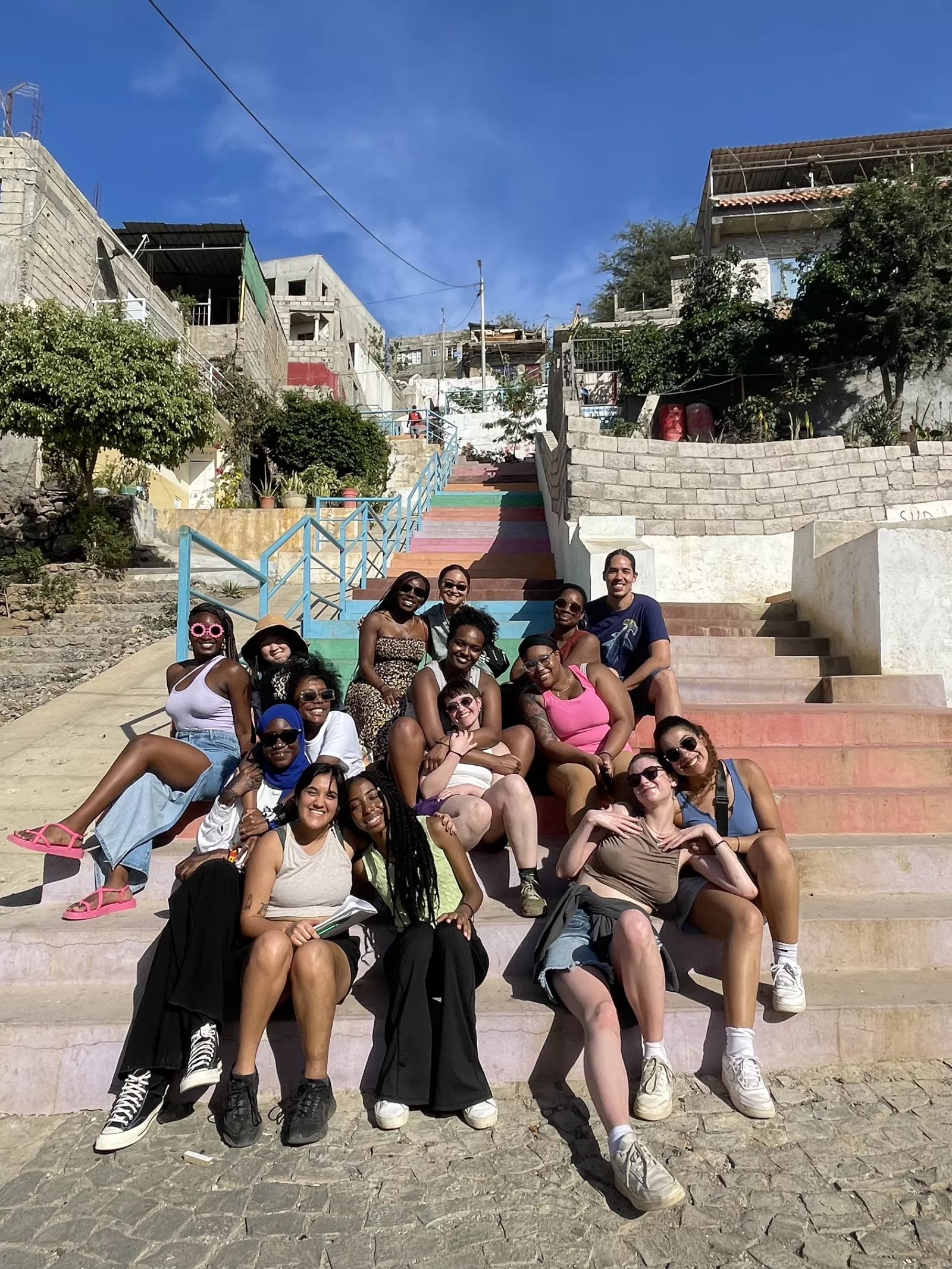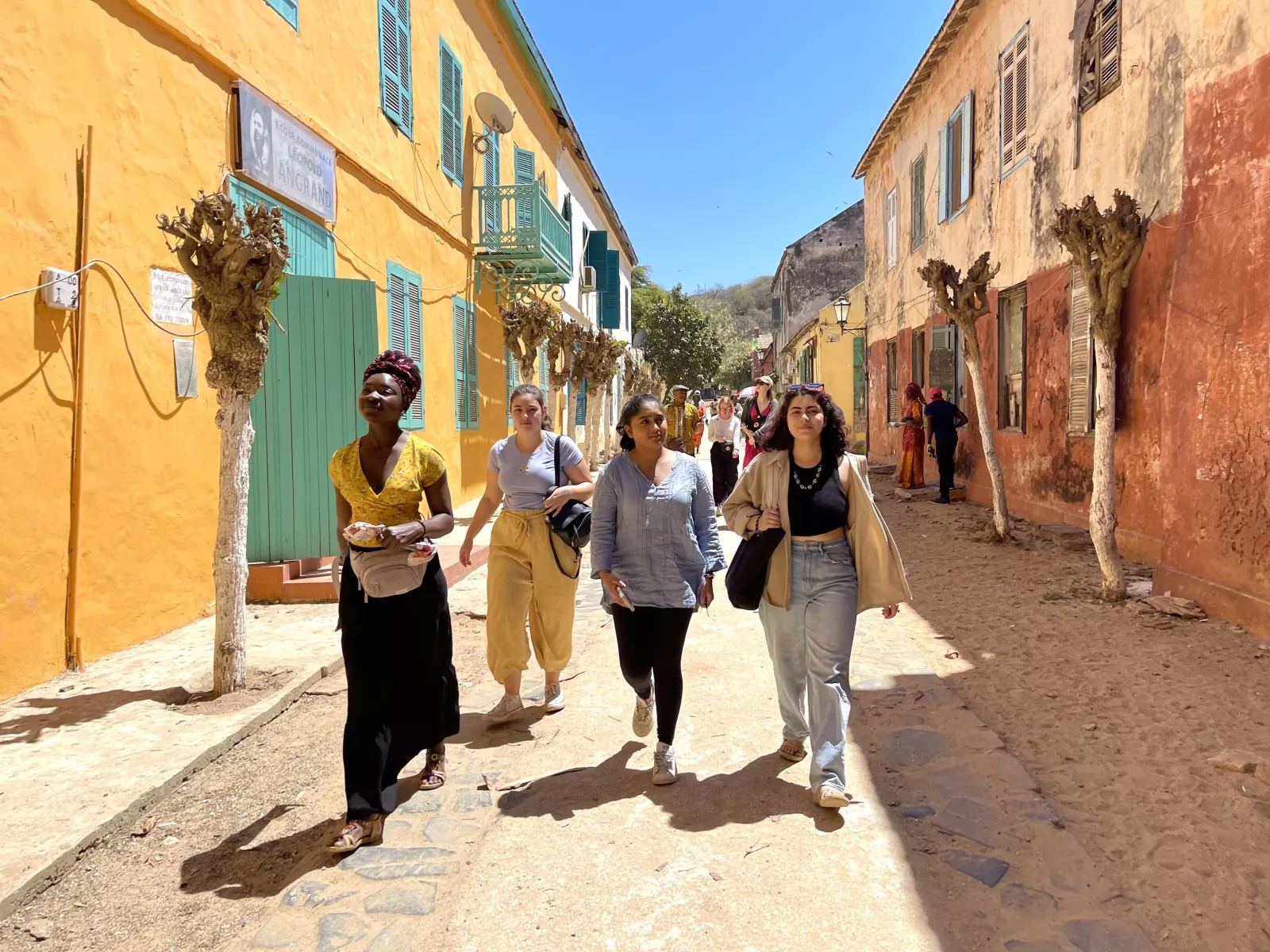This spring, two groups of Mawtrers set out on the trip of a lifetime. Each group was headed to a different part of West Africa: Dakar, Senegal and Praia, Cape Verde. These two cohorts of intrepid travelers participated in Bryn Mawr’s 360° Program, an interdisciplinary approach to learning that clusters courses from different areas of knowledge to address an overarching question. This semester, the two clusters were centered around liberation and tradition in post-colonial African countries. Paradigms of Revival: Black Liberatory Education, Embodiment, and the Arts had classes in dance with Assistant Professor of Dance Lela Aisha Jones, liberatory education with Assistant Professor of Education Chanelle Wilson, and history of African art with Associate Professor of History of Art Monique Scott. African Traditions: Healing in a Globalized World saw classes in literature and art offered by the French department, taught by Agnès Peysson-Zeiss, and indigenous medicine offered by the history department, taught by Kalala Ngalamalume. Each cluster includes a short-term field experience to gain a hands-on exploration of what they study.
The Paradigms of Revival: Black Liberatory Education, Embodiment, and the Arts cohort traveled to Praia, Cape Verde over Spring Break, to explore in tangible ways how Black liberation occurs in educational, artistic, and museum spaces. The cluster spent most of its time interacting with and learning from educators, artists, and organizers, who worked together within the community to develop a sense of artistic and cultural liberation in Cape Verde. This country long suffered under Portuguese colonial rule and gained full autonomy in 1975. Now, many Cabo Verdeans use their strong ties to community and culture to educate future generations about the nation’s history. Kimiye Maeshiro '23 describes how she saw this education firsthand in Kwame Gamal, a high school P.E. teacher who uses his class time to teach students forms of Cabo Verdean dance, art, and music, as the students at this trade school are not taught about their culture in their current curriculum: “On our very last evening, he brought together all of his students and lots of his friends and family members to put on this really big Carnival performance for us.” The Carnival had over 100 community members performing, from "itty bitty two- and three-year-olds" to full grown adults. "It was really interesting to see so many people come together with a specific goal in mind, and have it actually happen and follow through," Kimiye said, while reflecting on her key take-aways from the trip. "To be someone in a collective doesn't mean you all have to believe the same thing or do the exact same thing, but when you are able to play into each other’s strengths and weaknesses and really come together on the same page, a lot of things can happen."
Just east over the Atlantic, in Dakar, Senegal, Alloyah Abobi '24 and her classmates learned about the power of traditional medicine and the effects Western colonialism has on it. "My cluster is African Traditions: Healing in a Globalized World. We focused on the question: 'How do local healing and cultural traditions continue to change in the post-colonial world we live in?'" To do this, the cluster spent time exploring Senegalese herb and spice markets, as well as engaging with both traditional healers and practitioners of Western medicine. Alloyah described her experiences learning about differing perspectives on healing, especially ones that considered it taboo. For some people, she says, "There is a sense that if you’re going to see a healer, you're going behind God’s back and you should be going to God to heal you and treat you." Beyond learning about healing, Alloyah and her cohort had the opportunity to spend time in Senegalese family systems and gain a sense of appreciation for the strong ties to the community that exist there. "One of the last nights we spent with our tour guide, he brought us to his house. It was one of the first instances where we were able to experience a true Senegalese household and hospitality." Alloyah continues, sharing, "We got to eat food communally and share a meal with one another, and I think it was part of healing in a way. We talk about herbs and healing our bodies medicinally, but we don’t really talk about spiritually and mentally nourishing yourself. When you give so big, you have to be able to recover big, and having that sense of community was really nice at the end of the trip."
Both Kimiye and Alloyah returned from their field experiences with a deeper appreciation for the ways community, culture, and tradition can heal people, both in body and in spirit.
In the coming weeks, each cluster will present a reflection to the campus community. Please join Paradigms of Revival students on April 27 in the Cloisters from 1 to 2:30 p.m. to engage with liberatory practices in embodiment, visual arts, and education. The African Traditions cluster will present student work in the Campus Center Main Lounge on May 1 at 11 a.m.

